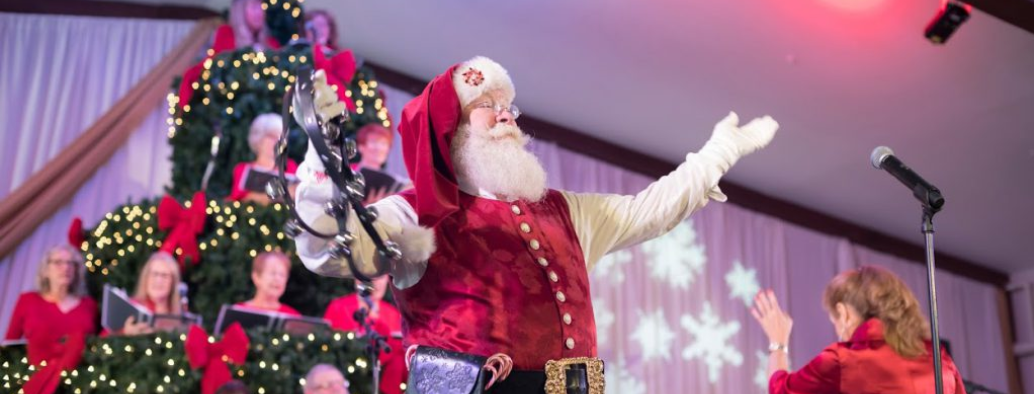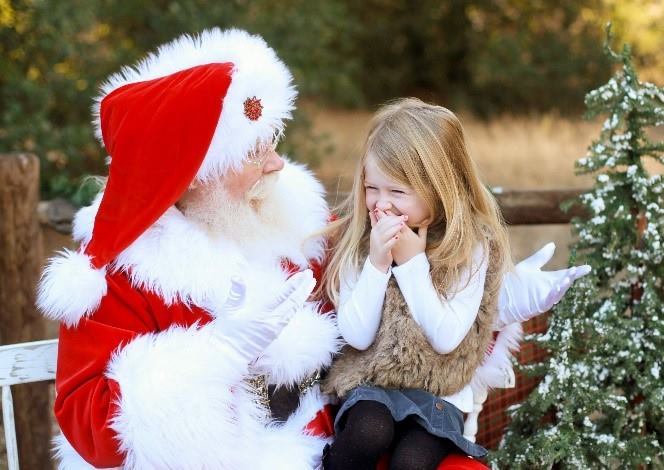Making the Unbelievable Believable
Five Tips for Developing your Unique Character
The twinkling eyes. The gentle chuckle. The mischievous smile, as he strides into the room casually, one thumb in his belt. He surveys the room and then pulls out an old pocket-watch, glances at it, nods, and says, “I know you have questions. Why don’t we sit down and chat?” And you know as you sit down with him, catching the vague scent of fresh baked cookies, that this impossible person is going to going to be amazingly real. And that’s impossibly wonderful!
That is our Christmas Performer art: Making the unbelievable believable, in thousands of encounters, with people from all ages and all walks of life, from one-on-one to large crowds, from up close and personal, to video messages. It is a very unique craft.
What is it then that makes a character real?
We perceive the world through many senses. Getting people to “buy in” and allowing themselves to believe depends on subtle, nuanced things such as the meta-language of the eyes, how we carry ourselves, voice timbre, pacing, and so much more. It’s a whole package deal.
As performers, we use many tools to create magical moments: Voice, Physicality, Props, Character Research, and Back-Story, to name a few. We want to use them all to help create that unique impression. Right now, when we are out of season, is a good time to develop the internal work that will help you nail that performance, even when you are tired. Remember, your best character work is built around your own personal style.
Here are Five Handy Tips!
- Research. Researching your character is going to help you form a body of knowledge. Ever talk to someone who really knows their stuff? Their confidence shines out, and it is engaging. Your research will help you answer questions and, more importantly, help you decide how you as your character feels about things.
Tip: Talk to your fellow performers and ask them for great links, resources, and books they recommend. Who is your local Lore-master? - Back Story. Your character came from somewhere, and his or her life experience shapes how to deals with the world. Consider these events in St. Nicholas’s life: His parents were foreigners (Greek) in the place he was born. He was orphaned at age ten. At one point, he was sentenced to prison. How would this affect him? Or ponder when and how did Mr. and Mrs. Claus meet? Did they have children? This is where you decide your “Santa Path,” the specifics of your character. Are you the original St. Nikolas of Myra? Or are you the Toymaker in the Woods?
Tip: Have different folks interview you, to ask specific and broad questions. Record and write down the questions and answers from this experience. - World Building. What is your North Pole like? How many reindeer do you have? Who are your “Go-to” Elves? What is the yearly cycle like at the North Pole? How do you do all the things that you do? If you perform with a partner, do they know your story and world? When you perform with them, you engage in free-form improvisation based on a shared story.
Tip: Sit down and create your world with who you work with, and then build some flash cards with questions/answers. You can practice with each other on your way to gigs. - Motivation. Yes, “What’s my Motivation?” is a running joke amongst actors. But the question is a good one. Why does Santa or Mrs. Claus do what they do? Why do they deliver toys and not frozen fish? Why only one day a year? Ask any Christmas Performer, kids can ask some truly profound questions. And you can really stun the adults when you give a great answer to a glib question.
Tip: Know what is going on in your character’s life and make it an on-going tale. Consider what is new at the North Pole this year, this month, this day? Where did you just come from before this visit? What are some concerns you have? - Tools. Develop your tools. What you create internally—your stories, your world—will help you refine your character. How does your character walk? What sort of laugh do they have? How do they carry themselves? You will develop certain mannerisms when you are in character. Some, like peering over glasses or adjusting your mustache, can going to go hand-in-hand with the story you are telling. Other mannerisms may not be good, such as slumping when tired or not knowing how to smile with your eyes.
Tip: Try to improve at least one different skill set every off-season. One year could be singing, the next year, storytelling. Developing good performing skills takes time and effort.
Is “Good Enough” really good enough? You may ask yourself, “Why stress about performing skills? I put on the red suit, my beard looks pretty good, I went to Santa school again this year, so why not just “Ho-ho-ho!” and away we go?
Here are five very good reasons to be working on your performing skills.
- A. The photo companies and malls want uniformity. They need generic portrayals and need to be able to swap in and out performers. BUT, the more believable and engaging the performer is, the better the customers will like it. And that can translate into profit and reputation. If you are an awesome performer, you will get better gigs And if they have to choose, you want them to choose you.
- B. In non-mall gigs like Home Visits, Tree-lightings, and Corporate Events, performing is everything. Your bottom line is directly affected, including quote price and tips. Plus, this can all be a moving target. Your reputation and reviews, the posts on social media, and those important repeat bookings all depend on how awesome you are.
- C. Variety. The wider your repertoire, costuming, and entertainment offerings, are what makes it possible for you to get more interesting and enjoyable gigs. And each offering should have a tight skill set to go with it.
- D. What is an “A-List Christmas Performer?” Simply, someone who delivers a quality, reliable, product, who is adaptable and has some depth to what they offer. They have great word of mouth. And those people who need them, usually offer higher paying, and more interesting and fun gigs.
- E. Finally, there is your own personal satisfaction and belief in your unique offerings. When you build it yourself, you enjoy it more. And you know, that the same entertainment you offered in a mansion is the very same entertainment you offered in homeless shelter. It gives you the power to improve your offerings.
The Christmas Performer field is always changing. Malls come and go, clients spring up or fade away. But there are three things to remember.
- The best investment you can make is in yourself.
- No amount of costume or bling will make a bad performer better.
- You have the most fun when you are being true to your own art.
Christmas Performer Workshops is all about bringing it to the Next Level. We focus on helping people be BETTER PERFORMERS. Let us know how we can help your group or event!
Thanks for reading, and please feel free to share and repost.
If you have any questions, please feel free to contact Christmas Performer Workshops or email Santa@SantaTrue.com

